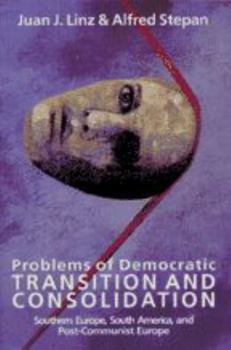Problems of Democratic Transition and Consolidation: Southern Europe, South America, and Post-Communist Europe
Select Format
Select Condition 
Book Overview
Since their classic volume The Breakdown of Democratic Regimes was published in 1978, Juan J. Linz and Alfred Stepan have increasingly focused on the questions of how, in the modern world, nondemocratic regimes can be eroded and democratic regimes crafted. In Problems of Democratic Transition and Consolidation, they break new ground in numerous areas. They reconceptualize the major types of modern nondemocratic regimes and point out for each type the available paths to democratic transition and the tasks of democratic consolidation. They argue that, although "nation-state" and "democracy" often have conflicting logics, multiple and complementary political identities are feasible under a common roof of state-guaranteed rights. They also illustrate how, without an effective state, there can be neither effective citizenship nor successful privatization. Further, they provide criteria and evidence for politicians and scholars alike to distinguish between democratic consolidation and pseudo-democratization, and they present conceptually driven survey data for the fourteen countries studied. Problems of Democratic Transition and Consolidation contains the first systematic comparative analysis of the process of democratic consolidation in southern Europe and the southern cone of South America, and it is the first book to ground post-Communist Europe within the literature of comparative politics and democratic theory.
Format:Paperback
Language:English
ISBN:0801851580
ISBN13:9780801851582
Release Date:August 1996
Publisher:Johns Hopkins University Press
Length:504 Pages
Weight:1.66 lbs.
Dimensions:1.2" x 6.2" x 9.2"
Customer Reviews
3 ratings
What leads to democray and consolidation
Published by Thriftbooks.com User , 17 years ago
As the title suggests, Linz and Stepan examine democratic transition and consolidation. Linz and Stepan argue that a democratic transition is completed when the relevant actors agree on the "the rules of the game." These rules include those regarding elected government: when and how the government is formed through free and fair elections, when and how the government has de facto authority to create new policies, and when the branches of government no longer have to share power with other bodies. When the government abides by the rules developed, Linz and Stepan would argue that it has become a democracy. Consolidation is achieved when the democratic system is viewed as "the only game in town," and the majority of the public subscribes to those institutions. Additionally, Linz and Stepan see a consolidated democracy as not simply a regime, but rather a system of interaction parts. These parts include civil society, political society, rule of law, bureaucracy, and an institutionalization of economic society. The authors use a number of explanatory variables when examining democratic transition and consolidation. These variables are divided into three categories. The first, macrovariables, include stateness, and prior regime type. The second, actor variables, includes the leadership base of the prior regime type, and who initiates and controls oppositions. Lastly, context variables include international influences, the political economy of legitimacy, and the constitution-making environment. Linz and Stepan argue that "democracy requires statehood." Without a state' ability to use coercive force, tax, and implement a judicial system, the five arenas of a consolidated democracy will not be achieved. However, it must be noted that state and nation are two different concepts. If there is conflict between the state and nations under its control, achieving democracy will be difficult. This leads to problems of legitimacy for the state. In order to address this, the concept of citizenship is imperative. The author's write, "there can be no complex modern democracy without voting, no voting without citizenship, and no official membership in the community of citizens without a state to certify membership" (28). The authors also suggest that the role played by prior regime type shape the paths available for transition, and what tasks remain to achieve consolidation. The authors move beyond the classic three regime typology and examine authoritarian, totalitarian, post-totalitarian, and sultanistic regimes. L & S argue that the ways in which the previous regimes structured pluralism, ideology, leadership, and mobilization affect the paths available to democratic transition. Linz and Stepan see five paths with can be taken towards democratic transition: the formation of pacts, defeat in war, interim government created after regime termination but not brought forth by the old regime, a military led coup, and some regime specific trans
On conditions for democracy
Published by Thriftbooks.com User , 23 years ago
Having read this book, I understand why Linz has gained international reputation. (As an example, he was made honorary doctor at The Faculty of Social Sciences at the University of Oslo, Norway, 2000.) This book is written in an engaging way, with lots of interesting information. Its clear structure and quite simple language also makes it easy to read. Those believing that political science is "heavy, dry and dull" will probably change their minds if they read "Problems of Democratic Transition and Consolidation". Personally, I found the chapters on South America very enlightening. The book gives information about how citizens view "democracy" in the respective countries, and the challenges each country faces in terms of democratic transition and consolidation. I agree with the first reviewer that this book is a must-have for all interested in the countries in question or political science in general. (Having just finished my dissertation in political science, I've read my share of less interesting and poorly written works!)
A clear and concise presentation
Published by Thriftbooks.com User , 23 years ago
This is the book for everyone looking for the ultimate answer to the questions regarding democratic transitions in the east as well as in the west. Although somewhat fuzzy and unclear in the theoretical outline it does offer some serious answers as well as questions on the democratization waves in former communist countries and dictatorships all over the planet. This is a must for all political scientists as well as those with inclination towards contemporary political subjects. This will be a standard opus on this subject.






